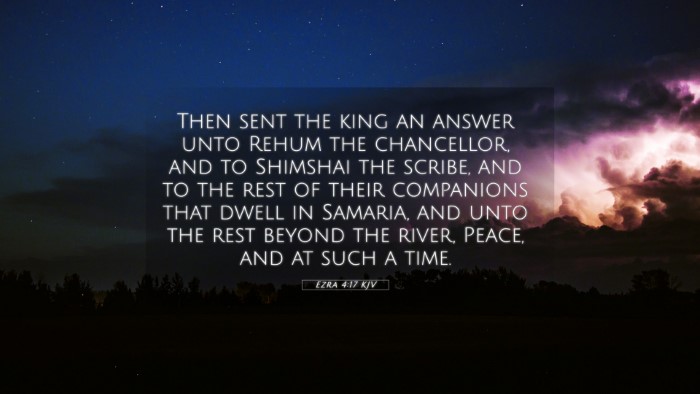Old Testament
Genesis Exodus Leviticus Numbers Deuteronomy Joshua Judges Ruth 1 Samuel 2 Samuel 1 Kings 2 Kings 1 Chronicles 2 Chronicles Ezra Nehemiah Esther Job Psalms Proverbs Ecclesiastes Song of Solomon Isaiah Jeremiah Lamentations Ezekiel Daniel Hosea Joel Amos Obadiah Jonah Micah Nahum Habakkuk Zephaniah Haggai Zechariah MalachiEzra 4:17 Similar Verses
Ezra 4:17 Cross References
Then sent the king an answer unto Rehum the chancellor, and to Shimshai the scribe, and to the rest of their companions that dwell in Samaria, and unto the rest beyond the river, Peace, and at such a time.
Uncover the Rich Themes and Topics of This Bible Verse
Listed below are the Bible themes associated with Ezra 4:17. We invite you to explore each theme to gain deeper insights into the Scriptures.
Ezra 4:17 Cross Reference Verses
This section features a detailed cross-reference designed to enrich your understanding of the Scriptures. Below, you will find carefully selected verses that echo the themes and teachings related to Ezra 4:17 KJV. Click on any image to explore detailed analyses of related Bible verses and uncover deeper theological insights.
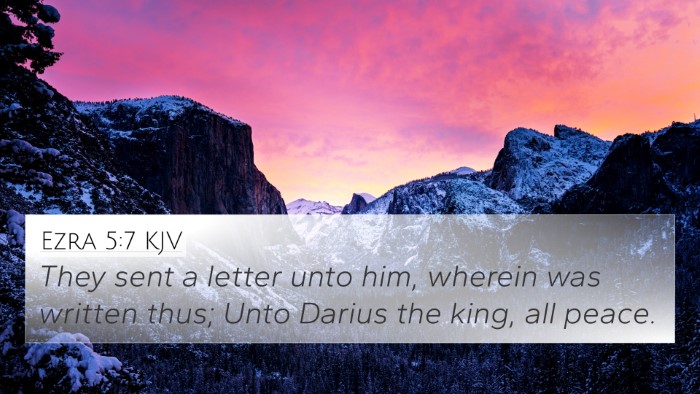
Ezra 5:7 (KJV) »
They sent a letter unto him, wherein was written thus; Unto Darius the king, all peace.
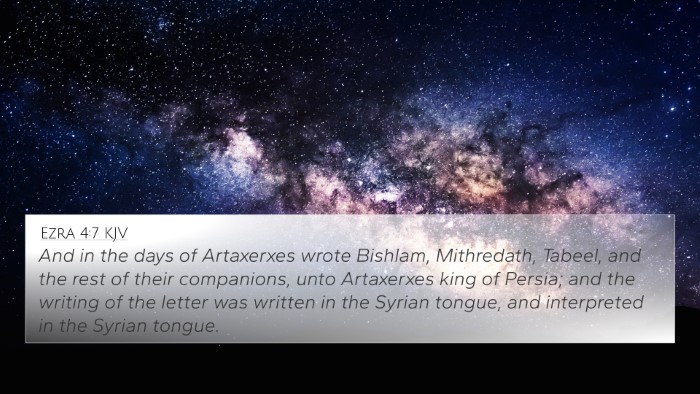
Ezra 4:7 (KJV) »
And in the days of Artaxerxes wrote Bishlam, Mithredath, Tabeel, and the rest of their companions, unto Artaxerxes king of Persia; and the writing of the letter was written in the Syrian tongue, and interpreted in the Syrian tongue.
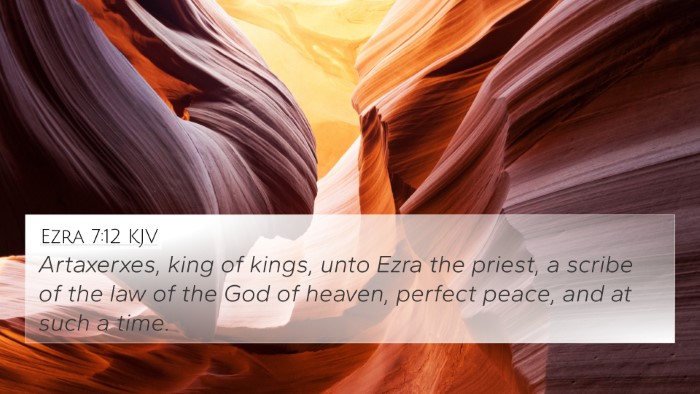
Ezra 7:12 (KJV) »
Artaxerxes, king of kings, unto Ezra the priest, a scribe of the law of the God of heaven, perfect peace, and at such a time.

Ezra 4:9 (KJV) »
Then wrote Rehum the chancellor, and Shimshai the scribe, and the rest of their companions; the Dinaites, the Apharsathchites, the Tarpelites, the Apharsites, the Archevites, the Babylonians, the Susanchites, the Dehavites, and the Elamites,
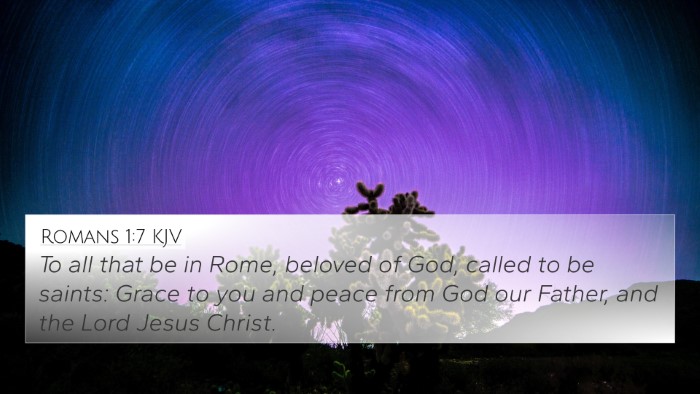
Romans 1:7 (KJV) »
To all that be in Rome, beloved of God, called to be saints: Grace to you and peace from God our Father, and the Lord Jesus Christ.
Ezra 4:17 Verse Analysis and Similar Verses
Understanding Ezra 4:17
Ezra 4:17 reads: "Then sent the king an answer unto Rehum the chancellor, and to Shimshai the scribe, and to the rest of their companions that dwell in Samaria, and unto the rest beyond the river, Peace, and at such a time."
Contextual Overview
The book of Ezra depicts the return of the exiled Israelites to Jerusalem and their efforts in rebuilding the temple. Ezra 4 focuses significantly on the opposition the Israelites faced during this critical period. In this particular verse, Ezra highlights a correspondence from the king of Persia, which is vital for understanding the political dynamics of the Israelites’ restoration process.
Key Themes
- Authority and Governance: The message from the king demonstrates the interplay between local governance and imperial authority.
- Opposition to God’s Work: The context reveals that the Israelites faced opposition from surrounding nations, illustrating the challenges encountered when pursuing divine projects.
- Peace in Communication: The king's greeting signifies an attempt to establish peace, a critical notion for building relationships amidst conflict.
Commentary Insights
Matthew Henry's Commentary
Matthew Henry elaborates that this passage reflects the king's response to accusations against the Jews, indicating that while they face opposition, divine purposes will ultimately prevail. Furthermore, he emphasizes the importance of proper conduct in correspondence as a means of maintaining peace and order.
Albert Barnes' Commentary
Albert Barnes notes that this correspondence reveals the king’s neutrality regarding the activities of the Jews and his intention to ensure that peace is maintained. He suggests that despite the Jews' struggles, the king's letter signifies an underlying support system that aligns with God’s plan for Jerusalem’s restoration.
Adam Clarke's Commentary
Adam Clarke remarks that the letter is a diplomatic means to foster interaction between the Jewish community and the Persian authority. He suggests that the mention of "peace" in the king's message is indicative of a strategic approach to governance, promoting stability during a tumultuous time.
Bible Verse Cross-References
Ezra 4:17 connects with several other scriptures that further illuminate its meaning and implications:
- Ezra 1:1-4: God stirs up Cyrus, showing divine orchestration through political leaders.
- Nehemiah 2:1-8: Nehemiah’s request to the king highlights the continued favor the exiles receive.
- Isaiah 44:28: Prophecy regarding Cyrus exemplifies God using rulers for His purposes.
- Romans 13:1-2: Authority is instituted by God, underscoring divine sovereignty over governance.
- Acts 5:29: The necessity of obeying God over human authority when conflicts arise.
- Psalm 146:3: A warning against trusting in mortal rulers, aligning with the Israelites' experiences.
- Proverbs 21:1: 'The king's heart is in the hand of the Lord,' showing divine control over earthly leaders.
Thematic Bible Verse Connections
The themes present in Ezra 4:17 resonate throughout both the Old and New Testaments, showcasing the interconnectedness of scripture. Some examples include:
- Divine Sovereignty: Seen in Daniel 2:21 where God is credited with controlling the rise and fall of leaders.
- Opposition Against God’s People: Relevant to 1 Peter 5:8, reminding believers of adversarial forces.
- Restoration: Echoed in Jeremiah 29:11, where God promises a future for His people, aligning with the Israelites’ return.
Conclusion
Ezra 4:17 serves as a critical juncture in understanding the challenges faced by the Israelites as they sought to reclaim their identity through the rebuilding of the temple. The insights provided by Matthew Henry, Albert Barnes, and Adam Clarke offer depth to the verse, illustrating the significance of political dynamics, the necessity of peace, and the overarching sovereignty of God in human affairs. By identifying cross-references and thematic connections, a more holistic understanding emerges regarding the scripture's message and its relevance across the entire biblical narrative.

